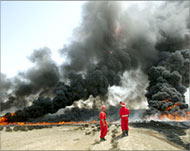Iraq donations in Madrid top expectations
Governments and international agencies have promised some $37.5 billion in aid and loans to help reconstruct war-torn Iraq, a sum well above initial expectations.

Pledges poured in on the final day of an international conference aimed at raising funds towards the $56 billion the United Nations and World Bank say the country needs to rebuild over the next four years.
The assurances came in various forms, including humanitarian and reconstruction aid, export credits and project finance. They will also be dispersed over a number of different durations.
Reuters calculated that pledges of aid and loans totalled around $17.5 billion over a maximum of five years in addition to the $20 billion promised by the United States.
“The Iraqi people will long remember the assistance we’ll provide them at this critical moment of challenge and hope,” US Secretary of State Colin Powell told the conference.
“A strong showing of support from this conference will speed reconstruction and hasten the day when Iraqis can assume full responsibility for their nation,” he added.
Beacon of democracy
|
“Whatever the disagreements earlier this year…we have now all come together with a shared determination to work with the people of Iraq to build a better future for them and for their region” EU External Affairs Commissioner Chris Patten |
Iraqi Governing Council President Iyad Allawi said the reconstruction effort would establish a beacon for democracy in the region. He added that the money would go some way to pacifying the country which has been racked by violence since Saddam Hussein was ousted in April.
Though many of the countries present at the conference were and remain against the US-led invasion of Iraq, intensive US lobbying coupled with the spectre of what impact an unstable Iraq could have on an already volatile region led the war’s detractors to stump up cash.
The World Bank said it would make between $3 billion and $5 billion available through to 2008, while the International Monetary Fund promised support of between $2.5 billion and $4.25 billion over three years.
Japan’s government made the largest offer after the US, pledging a further $3.5 billion in medium-term loans to bring its total promised aid to $5 billion.
Arab states
Saudi Arabia – one of the richest and most powerful of Iraq’s neighbours – announced a $1 billion financing package, split equally between project finance and export credits.
Kuwait also offered cash. Its total pledge was $1.5 billion though it said it has already spent $1 billion since the end of the US-led war. The remaining $500 million will be administered by Iraq’s oil-rich neighbour.
The European Union said its combined aid for rebuilding Iraq in 2004 had risen to some 700 million euros ($826 million), overtaking its contribution to Afghanistan last year despite widespread opposition to the war.
“Whatever the disagreements earlier this year…we have now all come together with a shared determination to work with the people of Iraq to build a better future for them and for their region,” EU External Affairs Commissioner Chris Patten said.
Iran
Iraq received a wide-ranging offer of help from its former bitter enemy Iran. The two countries were involved in a bitter eight-year war between 1980 and 1988.
 |
|
A large proportion of the monies |
Iranian Foreign Minister Kamal Kharrazi promised a credit facility of up to $300 million, offered cross-border electricity and gas supplies and said it would allow Iraq to export oil through Iranian terminals.
France, probably the most vocal opponent of the invasion of Iraq, repeated its regret that a recent UN Security Council resolution did not set a clearer timeframe for political transition in Iraq, saying this could have formed the basis for greater international support for reconstruction.
French Trade Minister Francois Loos announced no new aid, but described several ways in which France was helping Iraq and said Paris might envisage other types of help in future.
Russia Deputy Foreign Minister Yuri Fedotov pledged no government aid, but said Russian companies were ready to invest up to $4 billion in the Iraqi economy.
Pledges are continuing to roll in.
The money collected will go into two separate funds. One of these will be managed and overseen by the World Bank while the other will be administered by the UN.